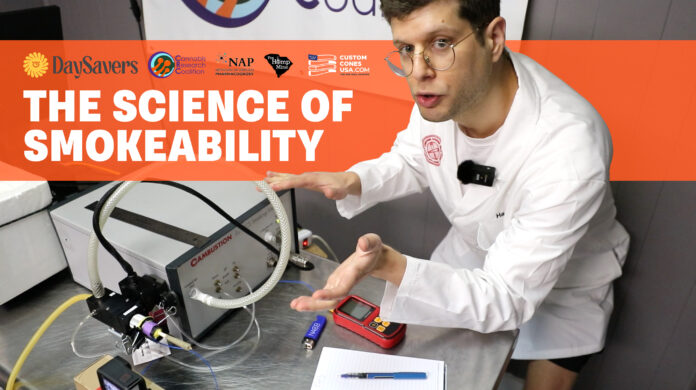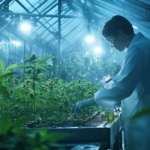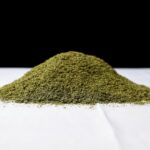SEATTLE — DaySavers has partnered with the Cannabis Research Coalition and The Network of Applied Pharmacognosy (NAP) on a first-of-its-kind study called The Science of Smokeability (SOS), which is looking to pay people to smoke pre-rolls for science. SOS is a 2+ year series of scientific experiments focusing on analyzing cultivation and processing metrics to evaluate which variables produce the most pleasant and least harmful smoking experience.
Currently, cannabis is cultivated to maximize yield and cannabinoid content. No study to date has ever evaluated how cultivation practices or post-harvest processing impact the smokeability of the final product. The SOS study promises to contribute significantly to the evolution of the cannabis industry by providing actionable insights that link cultivation and manufacturing practices to consumer experiences. This research not only has the potential to improve product quality and consistency, but also promote sustainability, profitability, and a deeper scientific understanding of cannabis as a medicinal and recreational product.
The study is currently taking place over the course of two years, integrating controlled laboratory data from smoking experiments with consumer research about smoking experience with different variables. The variables that will be studied include variations in mineral content, nutritional content (flushing), nitrosamines (potential carcinogens), moisture content, and the overall effect on ash color, smoke composition, and smoke quality.
Pre-rolls will be distributed to participants in selected phases of the study to gather qualitative feedback. DaySavers will be paying $4.20 to 200 randomly selected individuals, who will receive 2 free pre-rolls and be asked to fill out a qualitative survey comparing the 2 joints. Those interested in smoking pre-rolls for science and getting paid for their participation can sign up here. Individuals not selected as part of the 200 randomly selected participants can still participate in the study through various surveys throughout the study.
Harrison Bard, CEO and Co-Founder of DaySavers and its parent company, Custom Cones USA, says, “Through this research, we will be shedding light on some major unknowns in the cannabis industry. This type of research exists and has been proven to be extremely important in the tobacco industry, so we are excited to pave the way for a safer and more enjoyable future for the cannabis industry where quality and standards are at the forefront of cannabis cultivation and pre-roll product development.”
The study is being conducted by qualified researchers from various organizations including The Cannabis Research Coalition (CRC), an academic cultivation research group that is developing advanced cultivation techniques aimed at optimizing yield and quality of medicinal cannabis, and The Network of Applied Pharmacognosy (NAP), a nonprofit organization focusing on providing quality cannabis materials and tracking the experience of users. Dr. Allison Justice and Dr. Markus Roggen, two of the top researchers on the study, came together in 2021 for their groundbreaking work in exploring the hypotheses behind the color change of ash in cannabis smoking, sparking widespread interest and discussion. The SOS study has also partnered with Controlled Chemistry, experts in cannabis smoke and inhalation studies for cannabis, leveraging cutting-edge technologies and methodologies.
“This partnership highlights the pivotal importance of industry-wide collaboration and underscores the significance of research initiatives for shaping the future of the cannabis sector. This cross-departmental research collaboration extends beyond mere acquisition of sustainable and profitable cultivation and post-harvest metrics; we are actively establishing the benchmarks for ensuring the highest standards in producing flower intended for combustion,” said Allison Justice, PhD, founder of the Cannabis Research Coalition.
The first phase of findings are expected to be published in the coming months and will demonstrate how to optimize cultivation metrics to save time, money, and resources and enhance product quality. The first phase aims to foster greater brand loyalty and improve sustainable growing methods that maximize profitability for growers. Moreover, many states are hesitant to permit smokable flower due to uncertainties about the substances produced in cannabis smoke. The findings from the SOS study will be shared with ASTM Cannabis, an organization that establishes widely recognized industry standards, and will provide regulators with a solid basis for informed cannabis policy decisions.
Custom Cones USA will also be conducting an experiment for the study aimed at infused pre-rolls, testing different types of infusion processes and analyzing which ones burn the hottest, as well as which convey the most cannabinoids and terpenes. Sponsorship proceeds for the SOS study will be reinvested into the non-profit Network of Applied Pharmacognosy and The Cannabis Research Coalition to support the evolution of cannabis research.
About The Science of Smokeability Study
The Science of Smokeability (SOS) study is a pioneering 2+ year research project led by Dr. Allison Justice, Dr. Miyabe Shields, Dr. Riley Kirk, Dr. Markus Roggen, and Ashley Manning. This study explores how cultivation and processing metrics impact the smoking experience, filling a critical gap in cannabis research. Unlike past studies focused on yield and cannabinoid content, SOS evaluates the effects of cultivation and post-harvest processing on smokeability, aiming to enhance product quality, sustainability, and consumer satisfaction. By integrating qualitative surveys and quantitative analysis using advanced technology, the study seeks to determine objective measurements of quality to enhance the medicinal value of cannabis and provide consistent quality to consumers. Engaging regular cannabis consumers as experts, the study promotes open dialogue through social media, podcasts, and traditional media, connecting the community with the research process.












